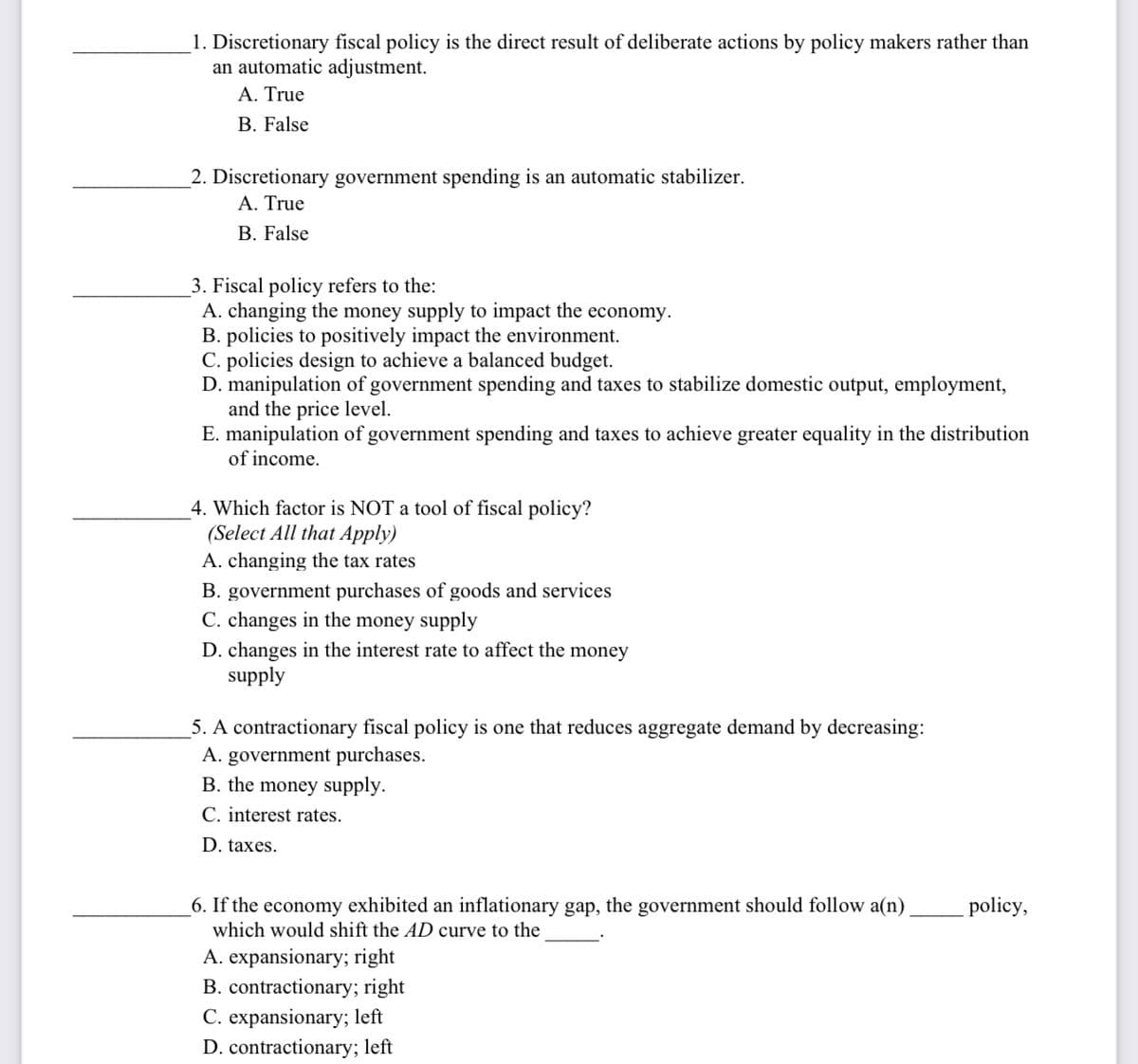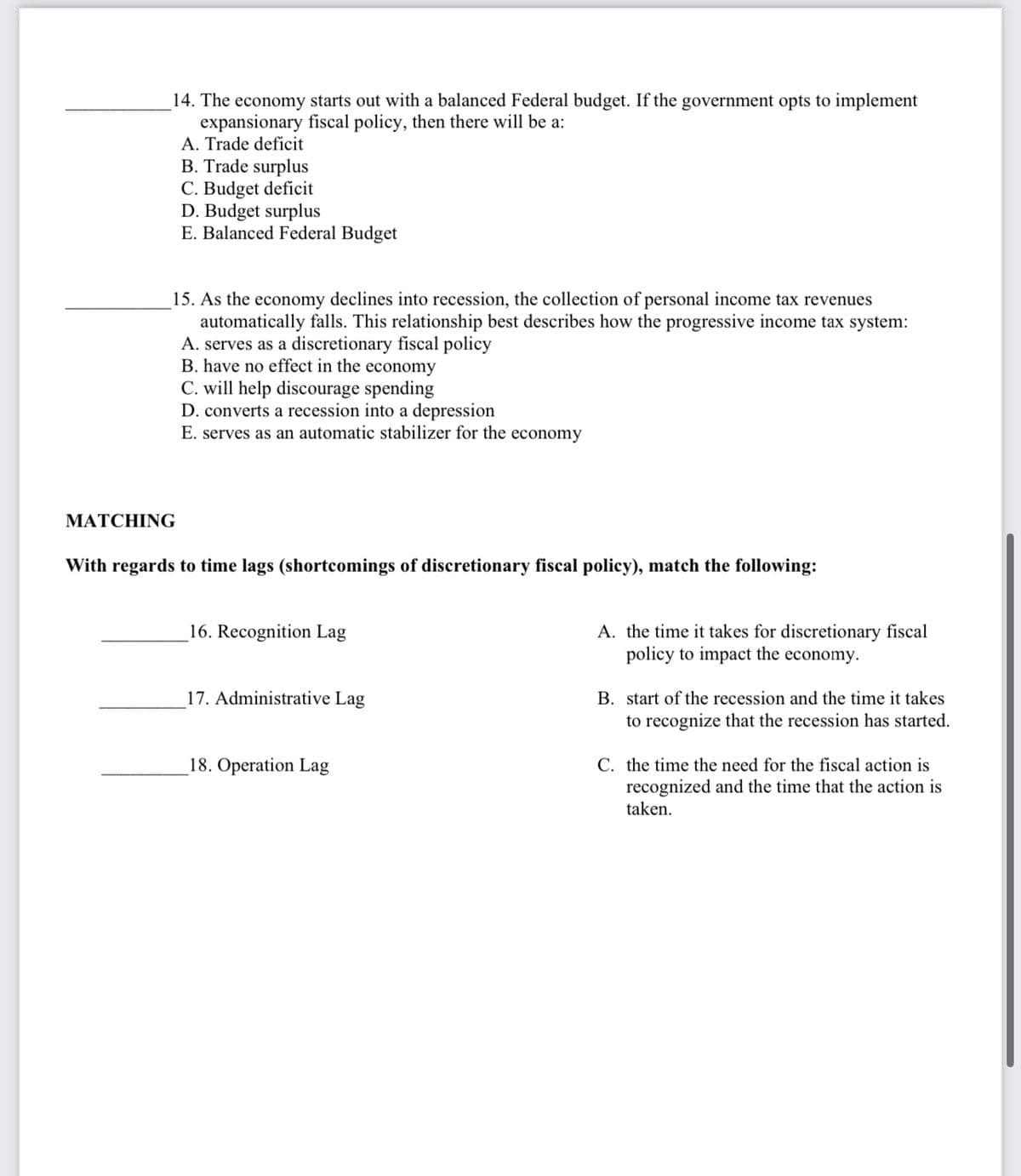1. Discretionary fiscal policy is the direct result of deliberate actions by policy makers rather than an automatic adjustment. A. True B. False 2. Discretionary government spending is an automatic stabilizer. A. True B. False 3. Fiscal policy refers to the: A. changing the money supply to impact the economy. B. policies to positively impact the environment. C. policies design to achieve a balanced budget. D. manipulation of government spending and taxes to stabilize domestic output, employment, and the price level. E. manipulation of government spending and taxes to achieve greater equality in the distribution of income.
1. Discretionary fiscal policy is the direct result of deliberate actions by policy makers rather than an automatic adjustment. A. True B. False 2. Discretionary government spending is an automatic stabilizer. A. True B. False 3. Fiscal policy refers to the: A. changing the money supply to impact the economy. B. policies to positively impact the environment. C. policies design to achieve a balanced budget. D. manipulation of government spending and taxes to stabilize domestic output, employment, and the price level. E. manipulation of government spending and taxes to achieve greater equality in the distribution of income.
Economics: Private and Public Choice (MindTap Course List)
16th Edition
ISBN:9781305506725
Author:James D. Gwartney, Richard L. Stroup, Russell S. Sobel, David A. Macpherson
Publisher:James D. Gwartney, Richard L. Stroup, Russell S. Sobel, David A. Macpherson
Chapter12: Fiscal Policy, Incentives, And Secondary Effects
Section: Chapter Questions
Problem 1CQ
Related questions
Question
100%
Please answer the following questions:

Transcribed Image Text:1. Discretionary fiscal policy is the direct result of deliberate actions by policy makers rather than
an automatic adjustment.
A. True
B. False
2. Discretionary government spending is an automatic stabilizer.
A. True
B. False
3. Fiscal policy refers to the:
A. changing the money supply to impact the economy.
B. policies to positively impact the environment.
C. policies design to achieve a balanced budget.
D. manipulation of government spending and taxes to stabilize domestic output, employment,
and the price level.
E. manipulation of government spending and taxes to achieve greater equality in the distribution
of income.
4. Which factor is NOT a tool of fiscal policy?
(Select All that Apply)
A. changing the tax rates
B. government purchases of goods and services
C. changes in the money supply
D. changes in the interest rate to affect the money
supply
5. A contractionary fiscal policy is one that reduces aggregate demand by decreasing:
A. government purchases.
B. the money supply.
C. interest rates.
D. taxes.
6. If the economy exhibited an inflationary gap, the government should follow a(n)
which would shift the AD curve to the
A. expansionary; right
B. contractionary; right
C. expansionary; left
D. contractionary; left
policy,

Transcribed Image Text:14. The economy starts out with a balanced Federal budget. If the government opts to implement
expansionary fiscal policy, then there will be a:
A. Trade deficit
B. Trade surplus
C. Budget deficit
D. Budget surplus
E. Balanced Federal Budget
15. As the economy declines into recession, the collection of personal income tax revenues
automatically falls. This relationship best describes how the progressive income tax system:
A. serves as a discretionary fiscal policy
B. have no effect in the economy
C. will help discourage spending
D. converts a recession into a depression
E. serves as an automatic stabilizer for the economy
MATCHING
With regards to time lags (shortcomings of discretionary fiscal policy), match the following:
16. Recognition Lag
17. Administrative Lag
18. Operation Lag
A. the time it takes for discretionary fiscal
policy to impact the economy.
B. start of the recession and the time it takes
to recognize that the recession has started.
C. the time the need for the fiscal action is
recognized and the time that the action is
taken.
Expert Solution
This question has been solved!
Explore an expertly crafted, step-by-step solution for a thorough understanding of key concepts.
This is a popular solution!
Trending now
This is a popular solution!
Step by step
Solved in 2 steps

Knowledge Booster
Learn more about
Need a deep-dive on the concept behind this application? Look no further. Learn more about this topic, economics and related others by exploring similar questions and additional content below.Recommended textbooks for you

Economics: Private and Public Choice (MindTap Cou…
Economics
ISBN:
9781305506725
Author:
James D. Gwartney, Richard L. Stroup, Russell S. Sobel, David A. Macpherson
Publisher:
Cengage Learning

Macroeconomics: Private and Public Choice (MindTa…
Economics
ISBN:
9781305506756
Author:
James D. Gwartney, Richard L. Stroup, Russell S. Sobel, David A. Macpherson
Publisher:
Cengage Learning

Brief Principles of Macroeconomics (MindTap Cours…
Economics
ISBN:
9781337091985
Author:
N. Gregory Mankiw
Publisher:
Cengage Learning

Economics: Private and Public Choice (MindTap Cou…
Economics
ISBN:
9781305506725
Author:
James D. Gwartney, Richard L. Stroup, Russell S. Sobel, David A. Macpherson
Publisher:
Cengage Learning

Macroeconomics: Private and Public Choice (MindTa…
Economics
ISBN:
9781305506756
Author:
James D. Gwartney, Richard L. Stroup, Russell S. Sobel, David A. Macpherson
Publisher:
Cengage Learning

Brief Principles of Macroeconomics (MindTap Cours…
Economics
ISBN:
9781337091985
Author:
N. Gregory Mankiw
Publisher:
Cengage Learning

Principles of Macroeconomics (MindTap Course List)
Economics
ISBN:
9781285165912
Author:
N. Gregory Mankiw
Publisher:
Cengage Learning

Principles of Economics, 7th Edition (MindTap Cou…
Economics
ISBN:
9781285165875
Author:
N. Gregory Mankiw
Publisher:
Cengage Learning

Principles of Economics (MindTap Course List)
Economics
ISBN:
9781305585126
Author:
N. Gregory Mankiw
Publisher:
Cengage Learning